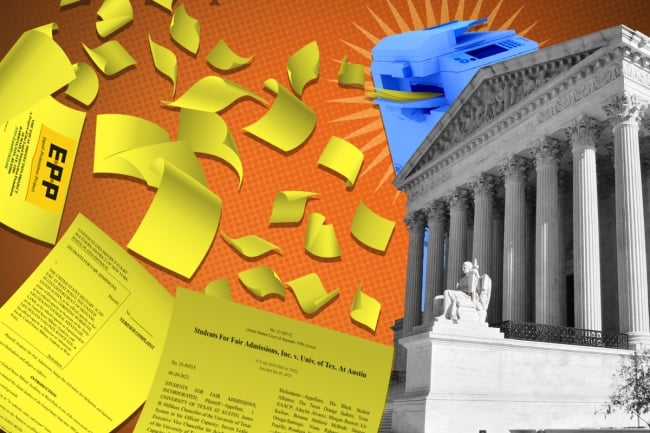You have /5 articles left.
Sign up for a free account or log in.

The Supreme Court ruling struck down affirmative action in admissions but opened the door for new legal challenges that could help determine the scope of the decision.
The Supreme Court’s June decision striking down race-conscious admissions may have been the most significant higher ed case in years, providing a concrete answer to questions that have spurred dozens of court cases since the 1990s. But it hardly put an end to the legal fight over affirmative action.
In fact, the outcome has unleashed a stream of new challenges to colleges’ race-conscious policies and revived cases that had been dismissed or lost before the ruling was handed down.
Just yesterday, Students for Fair Admissions, the group that spearheaded the Supreme Court cases against Harvard University and the University of North Carolina, filed a lawsuit challenging the race-conscious admissions policies of the U.S. Military Academy at West Point. SFFA began building the case after the Supreme Court left open the possibility that military colleges could be exempt from the affirmative action ruling due to their “potentially distinct interests” in enrolling racially diverse student bodies.
The organization is also in the process of revisiting lawsuits that were stayed pending the outcome of the Harvard and UNC cases. One of those, against Yale University, was dropped last week after the two parties reached an agreement that included promises of significant admissions policy changes from Yale; the other, against the University of Texas at Austin, is up in the air while the university and SFFA try to negotiate a settlement.
Other groups are also piggybacking on SFFA’s victory. Yesterday the conservative law firm Equal Protection Project filed a complaint with the Education Department’s Office for Civil Rights against Western Kentucky University over two scholarships—the WKU Athletics Minority Fellowship and the WKU Distinguished Minority Fellowship—available only to students of color. Last month the same organization filed a complaint against the University of Nebraska at Lincoln over a residency program for Black filmmakers that the university hosts in partnership with a local nonprofit.
William Jacobson, EPP’s founding director and a law professor at Cornell University, said colleges should expect to be held accountable for complying with the ruling.
“I don’t view the Supreme Court ruling with the narrow focus of affirmative action in admissions, or even affirmative action in general; it’s an equal protection decision,” he said. “It would certainly be in colleges’ best interest to change their policies now if they aren’t already compliant … Whatever the challenges were that failed before the decision, if those practices are ongoing, I don’t see why they can’t be challenged anew.”
Stacy Hawkins, a Rutgers University law professor whose work focuses on the intersection of diversity and jurisprudence, said despite the June 29 Supreme Court ruling, the outcomes of the subsequent legal challenges are by no means predetermined. And while the battle over race-conscious admissions may be over, she said, the ensuing skirmishes are key to determining the decision’s reach.
“Universities are going to have all sorts of different levels of risk tolerance associated with these cases as they come in, and Yale certainly took a very conservative posture,” she said. “But that’s important, because we will effectively continue to litigate the contours of admissions practices until we have some clear understanding of what the Supreme Court actually intends.”
Resurrecting a Lawsuit Lazarus
Along with the Harvard and UNC cases, SFFA filed affirmative action suits against the University of Texas at Austin in 2019 and Yale University in 2020. But judges put those lawsuits on hold once the Supreme Court took up the other cases, noting that future proceedings would depend on those outcomes.
Once Harvard and UNC were determined, Yale and UT were reopened, and SFFA had the leverage of a precedent in its favor.
In its agreement with SFFA, Yale said it would make wide-reaching policy changes impacting not only admissions but financial aid and data transparency as well—effectively conceding to a broad interpretation of the decision, which many lawyers say is overreaching.
That means SFFA’s only original affirmative action case that remains unresolved is the one against UT Austin, which can trace its origin back to the 2010s.
In 2013 a Texas circuit court ruled against the plaintiff in Fisher v. University of Texas, upholding Austin’s right to use race-conscious admissions. Abigail Fisher, a white student who believed UT’s policies had led to her rejection and amounted to discrimination, appealed the ruling. When that appeal reached the U.S. Supreme Court in 2016, the decision was upheld by a 4-to-3 vote, marking what seemed like the end of Fisher’s case.
In 2021 SFFA president Edward Blum—who, according to the reopened SFFA v. University of Texas lawsuit, is a family friend of Fisher’s and whose old organization, the Project on Fair Representation, covered Fisher’s legal fees against UT Austin—filed a lawsuit based largely on the same complaints, though SFFA noted in an email to Inside Higher Ed that the “claims are not the same.” It was frozen along with the Yale suit and reopened in June, effectively exhuming the corpse of the Fisher case and giving its arguments new life.
The two parties are now engaged in negotiations to determine whether the case will return to court or be dropped, according to Blum, who said he hopes to reach an agreement for a “mutual dismissal” along the lines of the one reached with Yale earlier this month. A spokesperson for Austin declined to comment on ongoing litigation.
But multiple sources, some on background, said it could be more difficult for SFFA to reach an agreement with UT than with Yale. For starters, the allegations are entirely different and rest on circumstances unique to the state and the institution.
Texas law regarding affirmative action has swung back and forth over the years. The state banned the practice in admissions in the 1997 Hopwood v. Texas case, in which UT Austin’s law school was found to have unlawfully given preference to certain racial groups in admissions; as a result the entire state university system discontinued race-conscious admissions practices. Then in 2003 the Supreme Court essentially reversed the Hopwood decision with its Grutter v. Bollinger ruling, prompting the university to recommit to affirmative action.
SFFA’s 2019 suit against UT Austin alleges that the university never fully committed to ending its affirmative action policies in response to Hopwood and looked diligently for workarounds until it “swiftly reintroduced race into admissions” following Grutter. The suit takes aim at Texas’s affirmative action practices since then.
Hawkins said that if SFFA is successful in getting UT to concede the way Yale did, it would further cement a more conservative interpretation of the Supreme Court decision, which she said is the ultimate goal of many of the more activist law firms pursuing these cases in the wake of the SFFA victory.
“What it confirms for me is a more cynical view, which is that this isn’t about pursuing a specific view of the Constitution,” she said. “It’s a project to preserve white supremacy and attack pluralist democracy.”
She added that any potential resistance from UT is likely to come from a stubborn insistence that its holistic policies to increase diversity are indeed legal alternatives and not mere proxies for race-based affirmative action, rather than an ideological commitment to diversity efforts.
“Texas lawmakers have supported legislation to outlaw teaching CRT and implementing DEI initiatives in higher ed … I don’t think UT, just by not rolling over like Yale did and saying, ‘OK, we’ll grant you everything you’re demanding,’ is showing itself to be the kind of progressive institution it was in the ’90s,” Hawkins said. “It may just be that they have a better case.”
Opening the Floodgates
The flood of new civil rights complaints and court cases may be just beginning.
In 2021, a boutique conservative law firm called the Wisconsin Institute for Liberty and Liability sued the state’s Higher Education Aids Board over grants earmarked specifically for Black, Hispanic, South Asian and Native American students. The case was dismissed in 2022, but the attorneys appealed, arguing that if the Supreme Court struck down affirmative action it would buoy their argument.
Rick Esenberg, WILL’s president and general counsel, believes that’s precisely what happened. While he declined to elaborate on any further suits his firm might file, he said institutions “were already on thin ice” with race-based programs and scholarships, and the Supreme Court’s ruling hastened the thaw.
“It’s very difficult to see how a scholarship program where certain people are excluded from eligibility based on race can survive scrutiny now that the court has made clear these cases cannot be trumped by concerns about diversity,” he said. “I understand there’s a lot of opposition to [the ruling] among college administrators, but they need to face the fact that there’s a new reality.”
The Supreme Court ruling has prompted legal challenges from the left as well, mostly focusing on legacy preferences at highly selective colleges such as Harvard, which in July received an OCR complaint over its practices from a coalition led by the progressive nonprofit Lawyers for Civil Rights.
The legal basis of these complaints is the same, effectively, as those from the right: that preferences for children of alumni disproportionately benefit white students, to the detriment of other racial groups—a claim supported by plenty of research, including a blockbuster report from Opportunity Insights released in July.
“We have certainly noticed an uptick in conservative challenges to race-conscious programs and policies,” said Michael Kippins, a fellow at Lawyers for Civil Rights who helped file the complaint. “That, along with the Supreme Court’s decision in June limiting the consideration of race in higher education, made it all the more important for us to take initiative and pursue an environment where barriers to admission for people of color, like legacy preferences, are broken down.”
But conservative firms are the ones truly ramping up their efforts in the aftermath of the affirmative action ruling. Hawkins said that a number of factors—including a more conservative federal circuit bench largely appointed by former president Trump—coalesced with the Supreme Court ruling to create a “perfect storm” for a rapid-fire stream of new litigation.
“They have a receptive judiciary now, and I think they’re taking full advantage of that,” she said. “Litigation typically moves slowly, but there are shadow dockets on more activist circuit courts that are looking for opportunities to exercise their power, and I do think we’re seeing evidence of that happening more and more.”
Jacobson understands this shift; his EPP is preparing a full docket of legal challenges to race-conscious policies on everything from scholarships to summer programs, and even beyond higher education. He said that until colleges demonstrate an understanding of what he sees as the broad equal protection implications of the SFFA rulings, those challenges will keep coming.
“We have many other challenges we’re already planning on pursuing,” he said, “and we’re certainly going to be looking for more opportunities in the future.”








